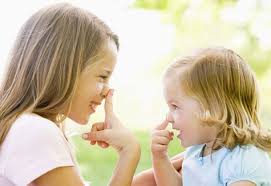You can listen to the podcast of this post at:
https://anchor.fm/boscom/
https://anchor.fm/boscom/
Hello, This
is Jose Parappully, Salesian priest and clinical psychologist at Sumedha
Centre, Jeolikote, with another edition of Psyche & Soul.
This
weekend, we shall reflect on our need to have around us empathic
and caring people who mirror our grandiosity, whom we can idealize and to whom
we feel connected, in order for us to grow up and remain healthy and happy.
I invite you
to imagine the following.
Jyoti is 11 months old – the time
when her parents are eager to see her take her first steps. One day her mother
takes Baby Jyoti outside into the courtyard, puts her down on the grass, holds
her by the hand and coaxes her to take a step or two forward. Jyoti obliges,
and holding on to her mother’s outstretched fingers takes a few steps. She then
leaves the mother’s hand and takes a few more wobbling steps forward – on her
own – as the mother watches proudly with delight. Baby Jyoti then stops and
looks back at her mother. She sees her mother’s eyes lit up as her baby girl
walks for the first time on her own.
Why was Baby
Jyoti looking back? She did that to see if her mother had recognized her great
achievement. Fortunately for her, the mother did recognize it and affirmed it,
as she beamed back at her, sharing in Jyoti’s excitement.
What Baby
Jyoti just experienced is “mirroring”
– an experience necessary for healthy emotional development according to Self
Psychology, another major contemporary psychological theory.
Mirroring is
someone who matters to us holding up a metaphorical mirror in which we can see
our “grandiosity” – our feeling of being great, capable, wonderful, beautiful,
etc. reflected back to us in the way they respond to us.
Self Psychology, founded by Heinz Kohut, holds that we need
frequent mirroring experiences to develop a strong, healthy sense of self –
what Kohut calls a “cohesive self.”
Mirroring
alone is not sufficient to develop a healthy, cohesive self. We also need
people around us to whom we can look up in admiration and feel connected to and
count on to provide strength, comfort and assurance. In the language of Self
Psychology this is the need for “idealization.”
When we have such people around us, we feel stronger and more confident and
develop a positive self-image.
Such idealizing experiences helps us, especially as a
developing child, to feel vicariously more powerful and more resourceful. It is
as if we walk proudly in the shadow of the admired other. Gradually the
qualities admired in the idealized other become internalized and strengthen our
sense of self.
In Self
Psychology these mirroring and idealizing experiences are known as “Selfobject” experiences, that is,
self-other experiences. These self-object experiences evoke, maintain and give
cohesion and strength to our self. They make us feel stronger, more confident
and help us develop self-esteem, so necessary to interact in healthy ways with
others.
Missing or
faulty selfobject experiences lead to what Self Psychology calls “narcissistic injury”– a great sense of
hurt and disappointment, resulting in an experience of fragmentation and
emptiness which weaken our sense of self.
Imagine what
Baby Jyoti in the example given would feel if the mother were not to notice her
great achievement, or indicate some delight in it, if she noticed. Something
would have collapsed within Jyoti, fragmenting her emerging sense of self.
Such
fragmentation, when experienced frequently, weakens our sense of self,
affecting our healthy development and undermining our capacity for healthy
relationships. Our self remains weak, fragile, and fragmented. Our
inter-personal relations and our professional effectiveness get negatively
affected. We would lack the confidence needed to reach out to others in love
and when we do, it leads to conflicts and heartaches.
So, to grow
with the self-esteem and self-confidence necessary to relate in healthy ways we
require mirroring and idealizing self-object experiences in childhood and it is
very important that those around us do not cause in us narcissistic injuries.
When narcissistic injuries do happen, it is important that caregivers help heal
them through empathic responsiveness.
…..
Take a
moment to allow experiences of gratifying mirroring and idealization experiences,
as well as memories of narcissistic injuries to come into awareness and stay
with the feelings these evoke in you.
……
No matter
how we might have missed mirroring and idealizing persons around us, we know that
we have a God who mirrors our grandiosity and is the kind of person we can
idealize. We are “God’s Beloved Sons & Daughters!” We can always glow in
the warmth of God’s unconditional love for us.
When we
experience a narcissistic injury this compassionate God reaches out to heal us.
Through the Prophet Isaiah God tells his people: “as one whom his mother
comforts, so I will comfort you” (66, 13). The psalmist says of God: “He heals
the broken hearted, and binds up all their wounds” (147, 3)
This comforting
and healing God is with us in the here and now. We could now approach this God
with all our narcissistic injuries and brokenness and allow God to touch us and
heal us.
We could spend
some time sharing with God our hurt and pain, and feel comforted. Imagine God
bending down, pouring healing balm into and binding up our wounds. We could then
remain quietly in the warm embrace of this healing God for a while and notice
what happens to us.
….
Have a
pleasant weekend. Be safe. Be blessed…. Bye for now.
Pictures: Courtesy Google Images








No comments:
Post a Comment